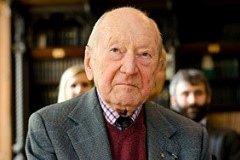
(Vienna, 01-12-2023) The Division of Nuclear Medicine of the Department of Biomedical Imaging and Image-guided Therapy at MedUni Vienna/University Hospital Vienna mourns the loss of Professor Emeritus Dr Rudolf Höfer, who passed away on 9 November 2023 after a long and fulfilling life.
Prof. Dr Rudolf Höfer was born on 18 March 1923 into a Viennese medical family. He completed his school education, including at the Humanistic Grammar School and the Realgymnasium of the Theresian Academy, as well as his medical studies at the Medical Faculty of the University of Vienna, interrupted by military service and five years as a prisoner of war in Africa.
He received his doctorate in medicine on 3 July 1953 and joined the then II. Medical University Clinic under Professor Dr Karl Fellinger. Professor Höfer was fascinated early on by the then new field of nuclear medicine. He was awarded a Fulbright Scholarship, which took him to San Francisco and the Donner Laboratory in Berkeley, USA. After his return, he took over the management of the isotope station in 1958. Initially, his research, diagnosis and treatment of thyroid diseases dominated, leading to his habilitation in internal medicine in 1966. After this, Prof Höfer was one of the leading forces in establishing nuclear medicine as a speciality in its own right. In 1973, nuclear medicine was established as an independent department and on 1 October 1983, Prof. Höfer was appointed the first full professor of nuclear medicine at the University of Vienna, a position he held until 1993.
In January 1972, Prof. Höfer was entrusted with the founding of a European Nuclear Medicine Society, which was established on 8 June 1974 in Clermont-Ferrand and of which he became the first secretary.
Prof Höfer was Secretary and President (1972-1978) of the then "Austrian Nuclear Medicine Society". He founded the symposium "Radioactive Isotopes in Clinic and Research" in Bad Gastein, which he organised from 1954 to 1993 and quickly developed into one of the leading international congresses in the field of diagnostic and therapeutic nuclear medicine. A special feature was the regular participation of scientists from Eastern Europe, which was possible in neutral Austria despite the restrictions of the Cold War. This led to a lively exchange and lifelong private friendships, and from today's perspective, these meetings can be seen as an important contribution to East-West rapprochement. Professor Höfer was later awarded honorary membership of the Austrian Society of Nuclear Medicine (ÖGNMB) for his services to the society.
On behalf of the International Atomic Energy Agency (IAEA), he was involved in setting up isotope stations in numerous Asian and African countries.
Prof Höfer was spokesman for the Professors' Curia and Vice Dean of the Medical Faculty of the University of Vienna from 1992 to 1993. As a member of the construction committee for the new AKH building, he played a key role in designing nuclear medicine as one of the largest and best-equipped university hospitals in Europe and was involved in its relocation to the AKH in 1992.
It is with deep sadness that we bid farewell to one of the founding fathers of Austrian and European nuclear medicine and one of its most influential representatives. His commitment to nuclear medicine in Vienna laid the foundation for its successful future. It is an honour for us to have known this special person, friend and mentor. Our sympathy goes especially to his family at this difficult time.
Prof Dr Marcus Hacker, Head of the Division of Nuclear Medicine, on behalf of all current and former employees